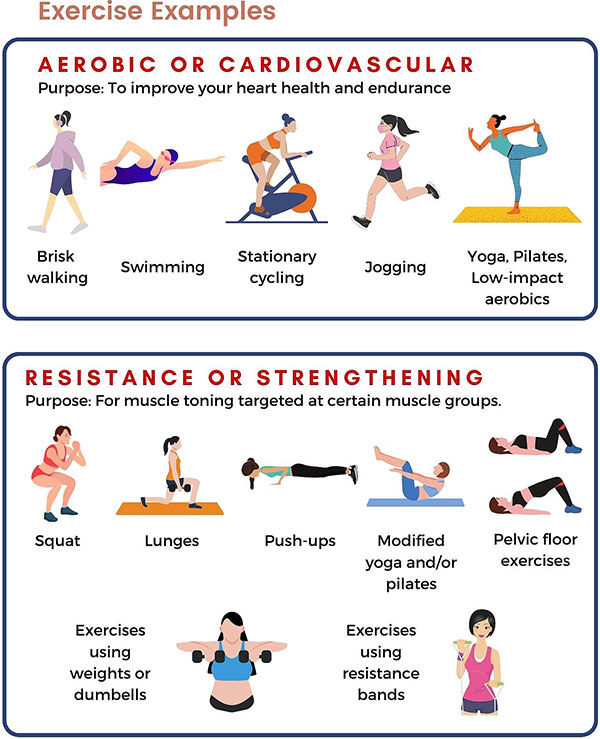
Safe Exercise During Pregnancy: A Comprehensive Guide
Pregnancy is a time of immense physical and emotional changes for women. While it’s essential to prioritize prenatal care and follow your healthcare provider’s advice, staying active during pregnancy can provide numerous benefits for both mother and baby. However, it’s crucial to approach exercise with caution and ensure that it’s safe and beneficial for your specific pregnancy.
Benefits of Exercise During Pregnancy
Regular exercise during pregnancy has been shown to offer a wide range of advantages, including:
- Reduced risk of gestational diabetes and preeclampsia
- Improved mood and reduced stress
- Increased energy levels
- Improved sleep quality
- Reduced back pain and other pregnancy-related discomforts
- Enhanced muscle strength and endurance
- Preparation for labor and delivery
Safe Exercises During Pregnancy
The American College of Obstetricians and Gynecologists (ACOG) recommends that pregnant women aim for at least 150 minutes of moderate-intensity aerobic activity or 75 minutes of vigorous-intensity aerobic activity per week. Some safe and effective exercises for pregnant women include:
- Walking: Walking is a low-impact exercise that can be enjoyed throughout pregnancy. It’s a great way to get your heart rate up and improve circulation.
- Swimming: Swimming is another low-impact exercise that is safe and refreshing during pregnancy. It provides support for your body and reduces the risk of overheating.
- Stationary cycling: Stationary cycling is a good way to get a cardiovascular workout without putting stress on your joints.
- Prenatal yoga: Prenatal yoga classes are designed specifically for pregnant women and focus on stretching, strengthening, and relaxation techniques.
- Pilates: Pilates is a low-impact exercise that can help improve core strength and stability.
- Strength training: Strength training exercises using weights or resistance bands can help maintain muscle mass and strength during pregnancy.
Exercises to Avoid During Pregnancy
While most forms of exercise are safe during pregnancy, there are certain exercises that should be avoided:
- Contact sports: Contact sports, such as football, hockey, and basketball, pose a risk of injury to both mother and baby.
- High-impact exercises: High-impact exercises, such as running, jumping, and aerobics, can put stress on your joints and ligaments.
- Exercises that require lying on your back: Exercises that require lying on your back, such as crunches and sit-ups, can compress the vena cava, a major blood vessel that carries blood back to the heart.
- Exercises that involve twisting or bending: Exercises that involve twisting or bending, such as Russian twists and deep squats, can put stress on your abdominal muscles and ligaments.
- Exercises that cause overheating: Exercises that cause overheating, such as hot yoga and spinning, should be avoided, especially in the later stages of pregnancy.
Listening to Your Body
It’s essential to listen to your body and rest when you need to. If you experience any pain, discomfort, or shortness of breath during exercise, stop immediately and consult your healthcare provider.
When to Start and Stop Exercising
Most healthy women can start exercising during pregnancy after the first trimester. However, it’s always best to consult your healthcare provider before starting any new exercise program.
If you were physically active before pregnancy, you can likely continue your regular exercise routine with some modifications. However, if you’re new to exercise, start slowly and gradually increase the intensity and duration of your workouts over time.
In the later stages of pregnancy, it’s important to pay attention to your body and make adjustments as needed. You may need to reduce the intensity or duration of your workouts or switch to less strenuous activities.
Staying Hydrated and Nourished
Staying hydrated and nourished is crucial during pregnancy, especially when exercising. Drink plenty of water before, during, and after your workouts. Also, eat a healthy diet that provides adequate calories and nutrients to support both you and your growing baby.
Safety Precautions
To ensure a safe and enjoyable exercise experience during pregnancy, follow these safety precautions:
- Wear comfortable, supportive clothing and shoes.
- Exercise in a well-ventilated area.
- Avoid exercising in extreme heat or cold.
- Warm up before exercising and cool down afterward.
- Listen to your body and rest when you need to.
- Stay hydrated and nourished.
- Consult your healthcare provider before starting any new exercise program or if you have any concerns.
Conclusion
Exercise during pregnancy can be a safe and beneficial way to stay healthy and prepare for labor and delivery. By following the guidelines provided in this article and listening to your body, you can enjoy the benefits of exercise while minimizing the risks. Remember to consult your healthcare provider for personalized advice and to ensure that your exercise program is tailored to your specific needs and pregnancy journey.